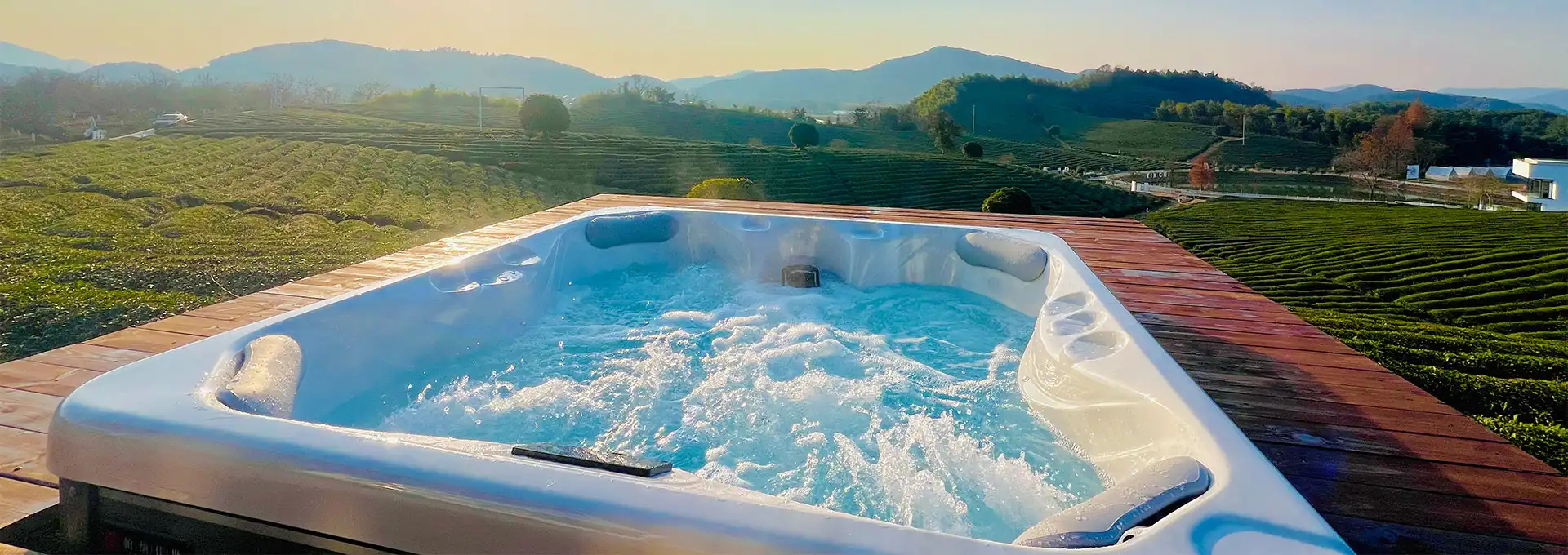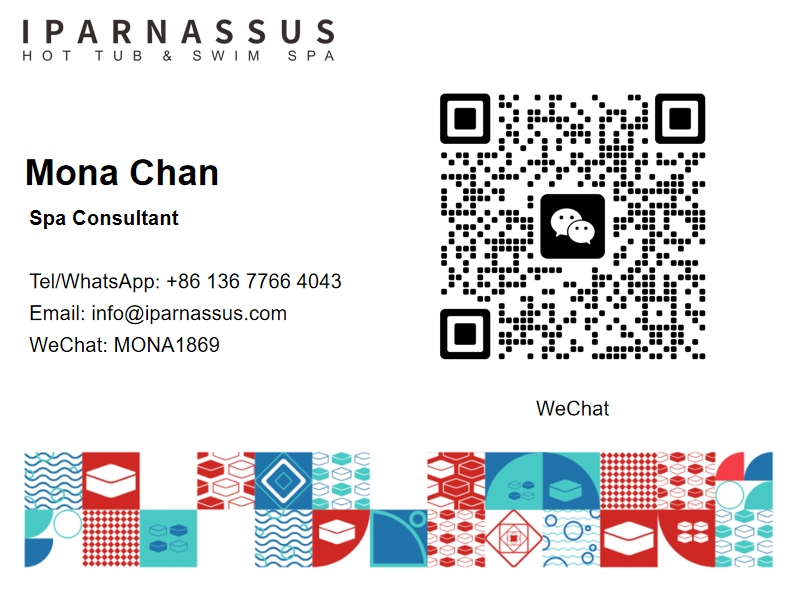What are the Best Energy-Efficient Hot Tub Solutions for Middle Eastern Hotels?
2024-11-05 11:22:57
In the competitive hospitality industry of the Middle East, hotels are constantly seeking ways to enhance guest experiences while maintaining operational efficiency. One area where these goals intersect is in the provision of hot tubs – a luxury amenity that guests love but can be energy-intensive. This blog post explores the best energy-efficient hot tub solutions tailored for Middle Eastern hotels, addressing the unique challenges and opportunities in this region.
How do hotel hot tubs impact energy consumption?
Hotel hot tubs are significant contributors to a property's overall energy consumption. In the Middle East, where energy costs can be high and environmental concerns are growing, the impact of hot tubs on a hotel's energy footprint is particularly noteworthy.
The energy consumption of hotel hot tubs stems from several factors:
1. Heating: Maintaining water temperature is the primary energy drain. In hot climates like the Middle East, this might seem less challenging, but the need for precise temperature control remains crucial for guest comfort and safety.
2. Pumps and Jets: The circulation and jet systems that keep water moving and provide therapeutic benefits also consume significant energy.
3. Filtration and Sanitation: Keeping the water clean and safe requires continuous operation of filtration systems and the use of sanitizing equipment, all of which require energy.
4. Ambient Temperature Control: In outdoor settings, especially in the scorching Middle Eastern summers, additional energy may be needed to cool the surrounding area for guest comfort.
5. Lighting: Many hot tubs feature underwater or perimeter lighting for ambiance and safety, adding to the energy load.
The impact on a hotel's energy bill can be substantial. According to industry estimates, a single commercial hot tub can consume anywhere from 20 to 40 kilowatt-hours of electricity per day, depending on its size and features. In regions where electricity costs are high, this can translate to thousands of dollars annually per unit.
Moreover, the energy consumption of hot tubs contributes to a hotel's carbon footprint. As sustainability becomes an increasingly important factor in hotel selection for environmentally conscious travelers, reducing the energy impact of amenities like hot tubs becomes not just an economic consideration but a marketing advantage.
However, it's important to note that the impact of hot tubs on energy consumption can vary greatly depending on the efficiency of the equipment, the climate, and how the hot tubs are managed. This is where energy-efficient solutions come into play, offering Middle Eastern hotels the opportunity to provide this luxury amenity while minimizing energy waste and operational costs.
What features should hotels look for in energy-efficient hot tubs?
When selecting energy-efficient hot tubs for Middle Eastern hotels, several key features can significantly reduce energy consumption without compromising the guest experience. Here are the essential elements to consider:
1. Advanced Insulation:
High-quality, full-foam insulation is crucial in maintaining water temperature with minimal energy input. Look for hot tubs with multiple layers of insulation, including the shell, cabinet, and cover. This is particularly important in the Middle East, where extreme temperature fluctuations between day and night can affect water temperature.
2. Energy-Efficient Pumps:
Variable-speed or multi-speed pumps allow for energy optimization. These pumps can operate at lower speeds for filtration and heating, consuming less energy, and ramp up only when jets are in use.
3. Smart Controls and Automation:
Intelligent control systems can significantly reduce energy waste. Features to look for include:
- Programmable operating schedules that align with peak usage times
- Automatic temperature reduction during off-peak hours
- Integration with hotel management systems for centralized control
- Real-time energy consumption monitoring
4. High-Efficiency Heaters:
Look for hot tubs with titanium or high-efficiency heaters that can quickly and efficiently warm water. Some modern systems use heat exchange technology to capture and reuse heat from other hotel systems, further improving efficiency.
5. Efficient Filtration Systems:
Advanced filtration systems that can clean water effectively while using less energy are crucial. Some systems use microfilters or UV sanitization, reducing the need for chemical treatments and the energy required for traditional filtration.
When considering these features, it's important to look at the overall system efficiency rather than individual components. A well-designed hot tub integrates these elements to create a holistic energy-efficient solution.
For Middle Eastern hotels, the ideal energy-efficient hot tub would combine these features with robust construction capable of withstanding the region's harsh climate. It should also offer customization options to blend with the hotel's aesthetic and brand identity.
One company that stands out in providing such solutions is Shenzhen Iparnassus Intelligent Spas Co., LTD. Their hot tubs are equipped with circulation filtration and sterilization systems that reduce the need for frequent water changes, directly addressing energy and water conservation concerns. With over 30 patents as of 2023, their innovative approach to hot tub design aligns well with the needs of Middle Eastern hotels seeking energy-efficient solutions.
Are there specific maintenance practices for hot tubs in Middle Eastern climates?
Maintaining energy-efficient hot tubs in the unique climate of the Middle East requires specific practices to ensure optimal performance and longevity. The region's hot, arid climate, occasional sandstorms, and in some areas, high humidity, present unique challenges that hotel maintenance teams must address. Here are key maintenance practices tailored for hot tubs in Middle Eastern climates:
1. Regular Cleaning and Filtration:
The dusty environment of many Middle Eastern locations means that filtration systems need extra attention. Implement a more frequent cleaning schedule for filters compared to other regions. Consider using multi-stage filtration systems that can handle fine desert dust particles effectively.
2. Water Chemistry Management:
The intense heat can accelerate chemical reactions and evaporation, affecting water chemistry. Test and adjust water chemistry more frequently, potentially daily during peak summer months. Use stabilized chlorine products to prevent rapid dissipation due to UV exposure.
3. Scale Prevention:
In areas with hard water, which is common in the Middle East, scale buildup can be a significant issue. Use scale inhibitors and regularly descale the system. Consider installing water softeners for the hot tub water supply if needed.
4. Cover Care:
The strong Middle Eastern sun can degrade hot tub covers quickly. Invest in high-quality, UV-resistant covers and implement a regular schedule for cleaning and conditioning them. Consider using light-colored covers to reflect sunlight and reduce heat absorption.
5. Evaporation Control:
High temperatures increase evaporation rates, which not only wastes water but also concentrates minerals and chemicals in the remaining water. Use liquid solar blankets or floating thermal covers when the hot tub is not in use to minimize evaporation.
6. Temperature Management:
In the scorching summer months, it might be necessary to cool the water rather than heat it. Some energy-efficient models can be switched to a cooling mode. During cooler months, use smart scheduling to heat the tub only when needed.
7. Pump and Jet Maintenance:
Sand and dust can wear down pump impellers and jet nozzles more quickly. Implement a regular inspection and cleaning schedule for these components. Consider installing additional pre-filters to protect the pump from fine particulates.
8. Sanitization Systems:
UV or ozone sanitization systems can be particularly effective in reducing chemical usage and maintaining water quality in the challenging Middle Eastern climate. Regular maintenance of these systems is crucial for their effectiveness.
9. Insulation Checks:
While insulation is crucial for energy efficiency, extreme heat can sometimes affect insulating materials. Regularly inspect the hot tub's insulation, particularly around pipes and under the cabinet, to ensure it remains intact and effective.
10. Energy Audit and Optimization:
Conduct regular energy audits to ensure the hot tub's energy consumption aligns with manufacturer specifications. This can help identify any inefficiencies early on.
11. Staff Training:
Ensure that hotel maintenance staff are specifically trained in the unique requirements of maintaining hot tubs in Middle Eastern climates. This includes understanding energy-efficient operations, water chemistry in high-temperature environments, and the specific needs of the advanced systems in modern energy-efficient hot tubs.
12. Guest Education:
Develop clear, multilingual instructions for guests on proper hot tub use. This can include guidelines on shower use before entering the tub, avoiding bringing in sand or dust, and the importance of replacing covers after use.
By implementing these maintenance practices, Middle Eastern hotels can ensure that their energy-efficient hot tubs continue to operate at peak performance, minimizing energy waste and providing a consistently high-quality experience for guests.
It's worth noting that companies like Shenzhen Iparnassus Intelligent Spas Co., LTD offer hot tubs with features that align well with these maintenance needs. Their systems, which include advanced filtration and sterilization capabilities, can significantly reduce the maintenance burden while maintaining energy efficiency. The company's experience in global markets, including challenging climates, makes their products particularly suitable for the unique demands of Middle Eastern hotels.
In conclusion, the best energy-efficient hot tub solutions for Middle Eastern hotels combine advanced technology with design features tailored to the region's climate. By focusing on energy-saving components, smart controls, and robust construction, hotels can offer this luxury amenity while minimizing operational costs and environmental impact. Proper maintenance practices, adapted to the local climate, are crucial for ensuring these systems continue to operate efficiently over time.
When selecting a hot tub provider, Middle Eastern hotels should consider companies like Shenzhen Iparnassus Intelligent Spas Co., LTD, which offer customizable solutions with features specifically beneficial for the region. Their commitment to innovation, as evidenced by their numerous patents and global presence, suggests a capacity to address the unique challenges faced by hotels in the Middle East.
By investing in energy-efficient hot tub solutions and implementing proper maintenance practices, Middle Eastern hotels can enhance their guest experience, reduce operational costs, and demonstrate their commitment to sustainability – a winning combination in today's competitive hospitality market.
For more information on hot tub installations and our products, please feel free to contact us at info@iparnassus.com.
References
1. Energy.gov. (2023). Energy-Efficient Hot Tubs and Pools.
2. Hotel Management International. (2024). Sustainable Luxury: Energy Efficiency in Hotel Amenities.
3. Journal of Sustainable Tourism. (2023). The Impact of Luxury Amenities on Hotel Energy Consumption.
4. Middle East Hospitality News. (2024). Trends in Energy-Efficient Hotel Design for Arid Climates.
5. International Journal of Hospitality Management. (2023). Water and Energy Conservation Strategies in Middle Eastern Hotels.
6. Green Hotelier. (2024). Best Practices for Sustainable Hot Tub Management in Hotels.
7. ASHRAE Journal. (2023). HVAC Considerations for Spa Facilities in Hot Climates.
8. Environmental Science & Technology. (2024). Comparative Analysis of Energy-Efficient Water Heating Technologies for Commercial Applications.
9. International Journal of Environmental Research and Public Health. (2023). Water Quality Management in Public Spas: Challenges and Solutions.
10. Renewable and Sustainable Energy Reviews. (2024). Integration of Renewable Energy Sources in Hotel Amenities: A Case Study of Middle Eastern Resorts.
Send Inquiry
Related Industry Knowledge
- How to Choose Spa Supplier for Hotels, Resorts, or Villas?
- What Age Can a Baby Get in a Hot Tub?
- How to Fill Hot Tub?
- How Are Hot Tubs Shipped?
- How Thick of Concrete for Hot Tub?
- What is cold plunge tub?
- How to Run a Swim Spa Power Connector?
- How to keep a cold plunge tub clean?
- How to Maintain an Outdoor Hot Tub?
- How Much Does a Jacuzzi Hot Tub Cost?
_1768872582663.webp)


